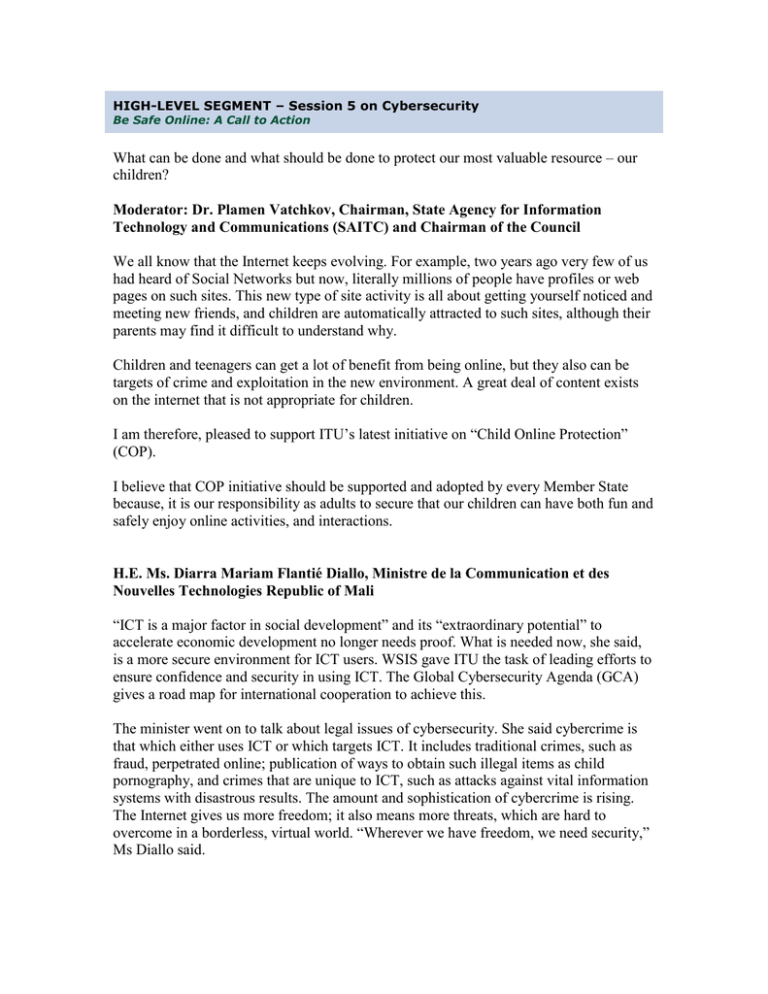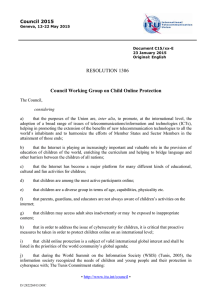What can be done and what should be done to... children? Moderator: Dr. Plamen Vatchkov, Chairman, State Agency for Information
advertisement

HIGH-LEVEL SEGMENT – Session 5 on Cybersecurity Be Safe Online: A Call to Action What can be done and what should be done to protect our most valuable resource – our children? Moderator: Dr. Plamen Vatchkov, Chairman, State Agency for Information Technology and Communications (SAITC) and Chairman of the Council We all know that the Internet keeps evolving. For example, two years ago very few of us had heard of Social Networks but now, literally millions of people have profiles or web pages on such sites. This new type of site activity is all about getting yourself noticed and meeting new friends, and children are automatically attracted to such sites, although their parents may find it difficult to understand why. Children and teenagers can get a lot of benefit from being online, but they also can be targets of crime and exploitation in the new environment. A great deal of content exists on the internet that is not appropriate for children. I am therefore, pleased to support ITU’s latest initiative on “Child Online Protection” (COP). I believe that COP initiative should be supported and adopted by every Member State because, it is our responsibility as adults to secure that our children can have both fun and safely enjoy online activities, and interactions. H.E. Ms. Diarra Mariam Flantié Diallo, Ministre de la Communication et des Nouvelles Technologies Republic of Mali “ICT is a major factor in social development” and its “extraordinary potential” to accelerate economic development no longer needs proof. What is needed now, she said, is a more secure environment for ICT users. WSIS gave ITU the task of leading efforts to ensure confidence and security in using ICT. The Global Cybersecurity Agenda (GCA) gives a road map for international cooperation to achieve this. The minister went on to talk about legal issues of cybersecurity. She said cybercrime is that which either uses ICT or which targets ICT. It includes traditional crimes, such as fraud, perpetrated online; publication of ways to obtain such illegal items as child pornography, and crimes that are unique to ICT, such as attacks against vital information systems with disastrous results. The amount and sophistication of cybercrime is rising. The Internet gives us more freedom; it also means more threats, which are hard to overcome in a borderless, virtual world. “Wherever we have freedom, we need security,” Ms Diallo said. In June 2005 Mali adopted a national strategy on ICT. However, ICT is absent from the country’s current laws (as in most developing nations). A new framework is being created, said Ms Diallo. Laws are being considered on e-commerce, e-government, and the protection of private data. There is also a need to adapt Malian law to international law, because cybercrime is a global phenomenon. Definitions of crime, for instance, must be understood across borders. She described the European Commission’s Convention on Cybercrime as a useful reference for everyone. “A global set of laws could be possible, and we need to share good practice on this,” the minister said. She ended by stressing that “as a woman and a mother, I am very aware of the dangers to children, so I am very much in support of the COP initiative by ITU.” Ms. Deborah Taylor Tate, Commissioner, Federal Communications Commission United States of America In the U.S., an entire section of our Department of Justice is dedicated to “Child Exploitation and Obscenity.” The FBI has developed the “Innocent Images National Initiative” which provides a centralized point of communication and information for local, national, and international governments and law enforcement bodies. Law enforcement officials are utilizing and enforcing statutory provisions for criminal behavior. This is post ante—or after an illegal act or harm to a child has occurred. Today’s discussion is about educating, preventing, and protecting our children’s precious lives before injury occurs. Thus, I am here today not only as an American, but also as a global citizen. In just the last few months, I’ve traveled to speak on this issue at APECTel, the Asian Pacific Telecom Ministers in Bangkok, and at the Global Forum in Italy. I’ve had the privilege of meeting with ministers from a variety of nations to hear what they are doing to protect children in the online world. While certainly not exhaustive, I have included a few examples of the many international initiatives. Thus, while our nations may differ regarding philosophy or specific regulatory oversight, we must all work together to develop solutions to the threats our children face online. Today’s session is an historic start. Now that the dialogue has begun, I would suggest the following: First, I believe we need an internationally-recognized forum for digital research, online behavioral practices, medical and psychological reports, and experimental studies. Second, we must continue to disseminate this information, to discuss and understand the technology, the threat, and the tools available to protect children around the world. Coordination among nations is vitally important because the internet connects and touches us all-- and all of our children. Third, through this sharing of research and expertise, we need to develop a clearinghouse of best practices, concepts that other nations can replicate. The ITU’s COP website which is under development is a first step so that leaders, industry representatives, teachers, and parents can link to successful real-world approaches. Fourth, we need leadership at all levels—from those of you here today representing your respective nations at the highest levels of government, to local municipal and city leaders, as well as media and industry partners, and teachers and caregivers in each of our nations and states. It is with this in mind, that I strongly urge global leaders and all of you gathered here today, to support ITU’s Child Online Protection Initiative because there is no doubt that there is an urgent need to ensure that all the good work being done globally to promote safety online is pulled together in a coordinated fashion and accessible to all human beings. Mr. Sherif Hashem, Executive Vice President, Info tech Industry Develop Agency Arab Republic of Egypt Egyptian efforts to make children safe online include raising awareness through the Education Initiative. This entails connecting Egyptian schools and universities to the Internet safely. The Suzanne Mubarak Women's International Peace Movement “Cyber Peace Initiative” is a showcase of best practices from around the world ensuring safe use of internet, raising awareness among Egyptian society about safe internet use through the Youth International Forum which took place in Sharm elSheik in September 2007 and the conference on Young People in the Internet and Mobile age: Safe and Empowered which took place in Cairo in March 2008. These conferences have helped to trigger a national and regional dialogue on how best to secure the safe use of internet. Parental control and limitations is another effort undertaken in Egypt with the collaboration of ISPs like TE-DATA, a leading Egyptian ISP, which initiated a “Safe Internet” option for households. Legal and Regulatory measures are also in place. A Children’s Law has been issued in 2008 containing special articles that address on-line child exploitation and pornography A special law enforcement unit has been established for cybercrimes as well. Message on behalf of Ann Venneman, Executive Director Delivered by Dr. Pascal Villeneuve, Associate Director UNICEF Access to information is a human right and a child’s right. It plays an important role in enabling the full participation of children and young people in society, and facilitating the adoption of life-enhancing pro-social behaviors and values. The child/media relationship is an entry point into the wide and multifaceted world of children and their rights - to education, freedom of expression, play, identity, health, dignity and self-respect, protection - and that in every aspect of child rights, in every element of the life of a child, the relationship between children and the media plays a role. Child pornography, sexual exploitation of children on-line, and other threats to a child’s physical and mental integrity are receiving increasing attention. The groundbreaking UN Study on Violence against Children, which was presented in October 2006, indicated that the scope of the problem seems to be expanding and that at least part of the solution is technical – for example using better screening or imprints and unique identifiers, or using blocking mechanisms. But there is also a part of the solution which relates to raising awareness among children and adolescents themselves, as well as among their parents and care givers, and those who work with children. UNICEF welcomes ITU’s efforts to strengthen the protection of children by identifying the key risks and vulnerabilities to children in cyberspace; creating awareness of the risks; developing practical tools to help governments, organizations and educators minimize risks; and by sharing knowledge and experience within the framework of strategic international partnerships to define and implement concrete initiatives. UNICEF applauds the involvement of the private sector in this initiative, and encourages the development of sustainable and productive public-private partnerships which allow the private sector in particular to participate as more than a donor or silent partner. Dr. Christiane Agboton-Johnson, Deputy Executive Director UNIDIR Cybersecurity is related to international security as a whole. And, in all matters of human security, children are at the centre. She said UNIDIR is trying to promote new ideas about ICT security. It is very easy to carry out cyberattacks, she added, but security is much weaker than for guarding other weapons. The Internet may be used to encourage young people to commit violence, said Ms Agboton-Johnson, citing the recent example of a teenager in Finland who shot pupils at a school, and then himself, after posting threats online. Ms Agboton-Johnson said that it is important to give stakeholders information that enables them to understand and respond to risks. Nowadays, she concluded, we must defend against attack not only from the air, the sea and on land, but also in cyberspace.

